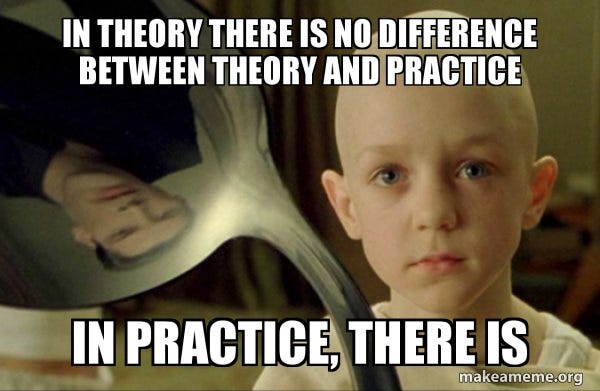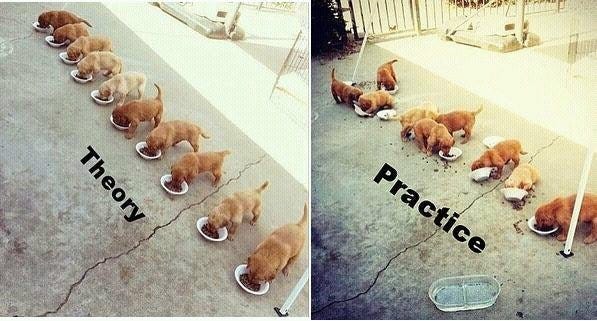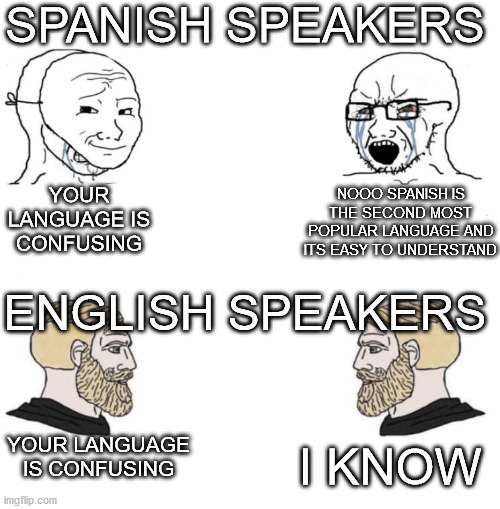Theory vs Practice
Go outside and touch grass
Welcome, aspiring polyglot! Theory is fantastic within the confined walls of a classroom, but the moment you step outside much of it will be useless. Words constantly change meanings, despite the best efforts made to maintain their integrity. If you are always spending time learning theory from someone in a classroom setting, the chances of you freezing up in the moment are high. Split time with practice and theory to ensure you are getting a balanced language education.
Due to the fact that theory is what is tested, most people and instructors will focus on the theory that will make it easy to pass the test. When you are looking for exam preparation or test taking courses, theory is great, but most of the people on their language acquisition journey don’t really care about a test. There is a reason native speakers struggle so much when being tested on their own language. It’s not like they can’t speak their mother tongue, right?
Working with native speakers
While it is true that learning from native speakers comes with some inherent risks, that is mostly true in the technical sense. If you are interested in theory and linguistics, native speakers are not exactly the best people to work with in any language. What you will learn, however, is how to actually, practically, use the language rather than learning the theory of how you might speak. Oftentimes the way one speaks and the way a language is supposed to work are not aligned.
Slang is so prevalent in most languages that if you don’t learn how to use it effectively you will find yourself lost in a majority of conversations. Learning what a word used to mean is very different from learning a word for how it is used in modern times. It is easy to recognize this in English, you likely do this almost every single day. For whatever reason, the knowledge that this is normal goes out the window when sitting behind a desk memorizing verbs.
Sounding like a native speaker is deeper than simply nailing the accent. You must also be able to use the same words and expressions that native speakers use during their day to day life. Whether we like it or not, language evolves and many of the definitions that were once used are now altered. That is to say, a teenage is going to hear something different than a retiree even if you are using the same words to express what you believe to be the same thing.
In fact, there is a high likelihood that you experience this in your daily life while using your native language. The way you speak to adults is not the same way you would speak to children. At the same time, the way you speak to gen Z is going to necessarily be different from the way you speak to millennials. We have and had different slang and references that bond us as an age group. This is not a phenomenon unique to America or any one country in particular.
Here are some examples for you to visualize why dealing with this in English is just as bad, if not worse, than anything you will come across in your target language. Try to imagine explaining the meaning of the following words:
Ass, bad, sick, dirty, and cool.
Now, think about how these words work in conjunction with other words and you will start to see the trouble that comes with playing with definitions.
As descriptors: Badass is good. Good ass is good. Ass is bad. Big ass is big. Half ass is doing half the work. Whole ass is your whole ass. In many ways it amplifies the following adjective, but sometimes it means the opposite.
Sick means illness but also amazing, cool, interesting, or impressive. The same goes for dirty depending on your generation. But then, depending on your location dirty can also be a bad thing as in someone does you dirty. Now, imagine that English isn’t the only language where this happens, because it isn’t, and get ready for the same experience but inverse. Here are some examples in French:
Baiser used to mean “to kiss” but now it is a derogatory-ish (there are worse) way to say “have sex with”. Embrasser used to mean “to hug” or “to embrace” but now it means “to kiss”. Gros means “big” but it also means “dude” and “genre” means “genre” but it also means “as if”. So yes, it is great to learn a variety of words, but you cannot solely rely on their dictionary definition. Words will change over time, so it is vital that you use them for what they are in practice, not what they mean in theory.
One of the unique parts of learning a new language is that those with the most practice will obviously outperform theorists, but the theorists will be able to pass tests more reliably. This makes the choice relatively clear as most people would rather speak than pass a test and if that is you then practice is the route you must choose. Theory is great, but when you are reliant on it, being stripped of it can feel like a fatal blow to your confidence and that is something you must avoid.
Conclusion
The primary reason that classrooms fail students is because the focus is almost entirely on passing a test. Unfortunately this often means teaching theory rather than teaching practice and this leads to larger issues for students further down the line. Furthermore, when you learn that a word means something only to be confronted by the fact that it means something entirely different now, it can cause you to question everything you have learned.
By dedicating a portion of your study time to learning how native speakers actually use their language, you can safeguard yourself against these pitfalls. But consuming isn’t the complete answer. Yes, it is good to consume content from native speakers to understand how they communicate, but you must also learn to communicate for yourself at the same time. The ability to understand is great, but combining it with the ability to speak is what we are all after.
Requests
If you have anything you would like covered you can reach out to me on X, Instagram, or at odin@secondlanguagestrategies.com.
Additional Resources
Don't want to spend time playing catch up? Pick up the 3 Months to Conversational book now available on Amazon! 3 Months to Conversational
For more long form content be sure to check out the website!
Subscribe for new content on YouTube and TikTok!
Learning Spanish? We have begun aggregating resources in you Spanish Resource Newsletter!
Don't forget to pick up your very own French Language Logbook or Spanish Language Logbook!





